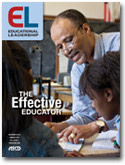Humility in an Age of Hubris
Humility: The word conjures up meekness, passivity, even submissiveness, and, in the worst case, obsequiousness. Yet this is a false humility. True humility is both a generosity of spirit and a quiet self-confidence. In teaching, it means understanding that although one may know a great deal, one does not know everything. It means being willing to learn from others, whether they be peers, 1st graders, or immigrant parents. It means treating all others—whether a parent with a 4th grade education or a professor with a PhD—as though they were as worthy and important as oneself. It means understanding that no method, strategy, or approach is the magic bullet to teaching and learning.
Although we cannot teach humility, at least by traditional means, we can nonetheless nurture and cherish it in school. We also cannot measure it, at least not by the blunt instruments currently in use. But we can easily assess it. We can see it in the eyes of students; in their self-possession and engagement; and in the respectful relationships we have with colleagues, students' families, and communities. In this age of hubris and shameless self-promotion, humility is an essential quality for teachers to have.
Excitement About Learning
Effective teachers are more than dispensers of knowledge—they ignite a passion for learning. As a student teacher, I had the opportunity to observe two educators presenting information about Greek mythology. The first teacher sat behind his desk and read a magazine while his students completed worksheets. It was painfully obvious that he lacked enthusiasm, not only for his content area, but also for teaching itself. His job was to fill students' minds with information, and nothing more. In the second classroom, the teacher and her students chattered excitedly about Zeus, Poseidon, and other mythological characters. Each morning, the students couldn't wait to share something new they'd discovered the night before.
Teachers who pique students' curiosity about a topic, provide them with the cognitive tools necessary to learn, and then engage them throughout the learning process are priceless. Can we measure this quality? You bet. Just ask the students. It's obvious which teachers are passionate—not only for their content area, but also for those they teach.
Making Meaning
In this age of instant information, the most important quality of an effective teacher is having the courage and ability to teach students to process what they've learned.
In the classroom, we teach such processing by having students practice critical thinking and problem solving as well as collaboration and communication. When we do this effectively, we will witness what Mihaly Csikszentmihalyi called "flow": Using existing skills, a student will accomplish an attainable challenge, acquiring new skills and confronting greater challenges along the way.
Teachers are also guides on the journey to synthesis, where a child's life takes root and flowers. Guiding students toward synthesis requires teachers to encourage the act of processing. Teachers may never see the results in the classroom, although parents and others outside it will.
The stories our students tell us give us faith. For example, weeks after our unit on making public service announcements, one of my 7th graders told me that she had noticed a glaring continuity faux pas in a movie she was watching at home. I likely won't be there the next time this student has such an insight about some experience in her life. And that's OK.
Reflecting on How You Teach
We can provide teachers with professional development in skills and strategies and exhaust the list of acknowledged best practices, but at the end of the day, an effective teacher needs to be thoughtful and intentional about implementing the correct strategies at the precise moments. To quote John Dewey, "It's not the doing that matters; it's the thinking about the doing."
Teachers need to gauge and strengthen their ability to reflect on their teaching by establishing self-reflective habits in the classroom. As administrators and instructional coaches, it's our responsibility to maximize the effect that each of our teachers has on the students in his or her classroom—and a skillful teacher selects, adapts, and refines every teaching move in a reflective, intentional way.
Willingness to Grow
The most important quality that an effective teacher possesses is the desire to continually evolve as an educator to meet students' changing needs. In addition to being self-reflective, teachers must be eager to seek out support and constructive feedback from supervisors and peers and to develop the tools and pedagogical knowledge they need to improve their instruction.
Identifying prospective teachers with these traits can be challenging during the hiring process. I have addressed this issue in several ways. First, I review candidates' evaluations from previous schools and ask them about some of the areas highlighted for improvement. I provide constructive feedback after they conduct a demonstration lesson and ask them about areas in which they would most like to improve. My goal is to assess how they receive feedback, how much they reflect on their practice, and how often they set goals for personal improvement.
Designing Good Questions
Using an interactive whiteboard, having students work independently or in cooperative groups, lecturing, or using technology in the classroom can all be engaging and meaningful. But designing good questions is key to success in any lesson format.
Teachers need to design questions as part of the planning process. Too many teachers believe they can wing it when it comes to questioning, which often results in too many low-level, rapid-fire questions. Teachers should, on the contrary, use questioning to differentiate learning. We love to see teachers ask struggling students scaffolded questions that draw them into a lesson. We also like to see teachers ask higher-level questions that students answer and bounce off peers. Teachers should embed such questions into the flow of instruction in every lesson plan.
The Whole Kit and Caboodle
Recently, a group of highly effective teachers discussed what characterizes an effective teacher. We agreed that effective teachers continually observe their peers, engaging in regular professional discussions with other successful teachers. They are self-reflective, looking to improve both their classroom practices and their own learning. They don't give up on students, even the most reluctant learners. They frequently assess students' understanding and performance using a variety of means. They respect and incorporate the cultural context in which they are teaching. They take time to know students, and they use that knowledge to interpret student performance, adjusting their instruction accordingly. Finally, they deliberately develop an environment of trust, safety, and comfort for students because they truly care about them.
Teachers can't be effective if they exhibit only one or some of these characteristics—they need them all.
Flexibility and Strength
Effective teachers possess two interconnected qualities. Flexibility is the ability to use different techniques for different kinds of learners, to recognize that each student is unique and comes with a different set of instructions for how he or she learns best. Flexibility means having the sensitivity to know that when a student doesn't understand what you're saying, you don't merely talk louder and slower; it means having many arrows in your quiver, the most important one being a sense of humor.
Strength is the ability to withstand the onslaught of 26 or more different opinions in one class period, while recognizing that each student needs to understand the lesson in his or her own way. It is the ability to maintain high standards while challenging everyone. Moreover, strength is the ability to breathe calmly while inside you feel as though you want to scream or cry. And strength is the willingness not to get into a power play with a student to show that you are stronger.
One can assess these qualities in a teacher by seeing whether the students are successfully learning the skills being taught. And one of the best ways to do this is by asking students to apply those skills in another situation or to teach them to a peer.


